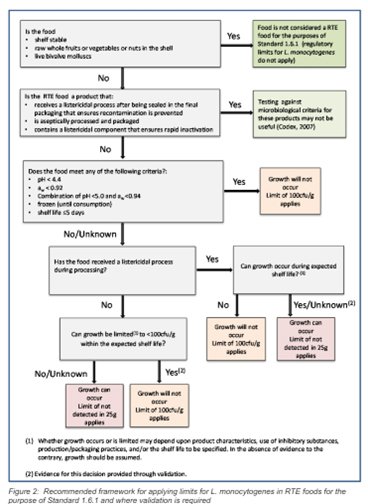
The World Health Organization identifies high risk foods as deli meat, ready to eat-meat products, soft cheeses and cold smoked fishery products.
According to the WHO “In past outbreaks, foods involved included ready-to-eat meat products, such as frankfurters, meat spread (paté), smoked salmon and fermented raw meat sausages, as well as dairy products (including soft cheeses, unpasteurized milk and ice cream) and prepared salads (including coleslaw and bean sprouts) as well as fresh vegetables and fruits.”
Fruits & Vegetables:
Fruits, vegetables, salads and assembled ready to eat foods are at a high risk of Listeria contamination. Raw vegetables and fruit can become contaminated with Listeria either through contact with soil or with animal manure that is used as fertilizer. Processors working with foods susceptible to Listeria are required to have controls to prevent (cross) contamination. Despite these controls, fruits & vegetables often test positive for Listeria.
Ready To Eat Meals (RTE):
Listeria contamination is typically found on the outside of cooked meat products. RTE products are especially at risk since Listeria continues to grow at refrigeration storage temperatures.
Bacteriophages and RTE Seafoods
Cheese & Dairy Products:
Cheese is washed and turned dozens of times before the rich and characteristic taste develops. Today this laborious task is executed by sophisticated robots which work day and night all year round.
Listeria contamination is typically found on the outside of cheese products. Preventive use ensures Listeria is accessible and not vested within the cheese matrix. Surface ripened washed rinds and white mould cheeses are especially at risk since growing conditions Listeria are ideal and there is a large risk for cross contamination.
Listeria is always a danger, by adding Phageguard L (PGL) to the ripening culture it can selectively combat Listeria and at the same time leave the necessary cultures unharmed. This prevents Listeria from contaminating and spreading from one cheese to the next on brushes.
Smallgoods:
Deli meats are associated with Listeria contamination. Listeria continues to grow at refrigeration temperatures during the shelf life of products that support the outgrowth of Listeria.
Seafoods:
Salmon processing has inherent risks for Listeria contamination for many reasons. These include the fact that fish enter processing with naturally occurring contamination and that there are many opportunities for cross contamination. PhageGuard Listex can help (Smoked) Salmon producers reduce their Listeria risks on the product itself as well as on processing equipment and environmentally.
Raw seafood regularly carries Listeria as it is ubiquitous in the environment. Cold smoked salmon is particularly at risk. Cooked seafood can become contaminated during processing.

